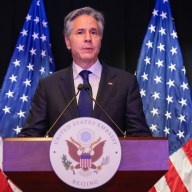OTTAWA – The Conservative government’s tough new talk on torture allegations represents a significant shift from the upbeat tone it has had towards Libya’s provisional leadership.
Canada protested formally to Libyan diplomats in Ottawa and Tripoli on Friday over reports of systemic torture under the country’s new interim government.
The diplomatic double-whammy was delivered in both capitals by the Foreign Affairs Department in the form of a note, or demarche, expressing Canada’s displeasure over credible reports of torture and deaths of captured loyalists of dead dictator Moammar Gadhafi in Libyan prisons.
It came after two leading and respected international agencies — the rights’ watchdog Amnesty International and Doctors Without Borders — sounded the alarm simultaneously on Thursday.
Amnesty said several detainees have died after being subjected to torture in recent weeks and months, and cited wide-spread, ill-treatment of Gadhafi loyalists.
Doctors Without Borders said it was pulling out of the city of Misrata because some detainees were brought for care only to make them fit for further interrogation.
The new leaders of Libya were helped to power by an air war waged by Canada and major allies, and have the backing of those Western governments.
“We are very concerned with these allegations. We will be raising these concerns with the interim Libyan government through official channels in Ottawa and Tripoli,” Joseph Lavoie, a spokesman for Foreign Affairs Minister John Baird, said in an email Friday.
“Canada will continue to help Libyans build a fair and democratic society that respects human rights and the rule of law.”
On two trips to Libya last year, Baird praised the courage and sacrifice of the country’s new leadership after hearing first-hand accounts of bravery and sacrifice.
His most critical remark about the new leadership was relatively gentle, and took the form of a well-worn talking point that Libya wouldn’t go from “Gadhafi to Thomas Jefferson” overnight. After his first visit last June, Baird opined of the new leadership: “Whatever happens, they couldn’t be any worse than Col. Gadhafi.”
When militias captured their most high-profile prisoner last fall — Gadhafi, himself — Prime Minister Stephen Harper offered no direct criticism of how they treated their despotic detainee. Videos at the time had depicted a frenzied pack of rebels savagely beating Gadhafi and apparently sodomizing him with a knife before he was shot dead.
“In terms of the particulars of the death of the former leader, I obviously don’t take any great pleasure in that,” Harper said in October. “And obviously when you see things happen outside the rule of law, they concern you.”
“But I also think we’re all realistic enough to know that, given the way he had ruled the country, that the chances of him meeting an end like that were probably pretty high.”
Harper’s office declined comment Friday and Baird was unavailable to elaborate further.
Baird remained in Davos, Switzerland, where he had accompanied Harper to the World Economic Forum earlier in the week, and was preparing for a trip to Israel with Finance Minister Jim Flaherty.
Over several days next week, the two ministers are to meet senior Israeli ministers and also planned a trip to the West Bank for meetings with Palestinian Authority President Mahmoud Abbas and Prime Minister Salam Fayyad.
In Davos on Friday, the United Nations’ top human rights official told Libya’s new transitional government to take control of its prisons to stop further atrocities against inmates.
“There’s torture, extrajudicial executions, rape of both men and women,” Navi Pillay, the UN High Commissioner for Human Rights, told The Associated Press.
“Something has to be done immediately to assist the authorities for the state to take control of these detention centres.”
Pillay said various militias — the rebel groups who toppled the Gadhafi regime with the help of NATO-led air strikes — are holding as many as 8,000 prisoners in 60 detention centres around the country.
Pillay said she was concerned about the plight of the many sub-Saharan African detainees among that number because the militias assume they were supporters of Gadhafi.
Pillay said Libya’s new leaders would need help to take control of the prisons and run them properly.
Canada has already committed about $20 million to assist Libya’s new rulers.
Baird has said getting the guns out of the hands of Libya’s armed militias is a priority area for Canada’s future assistance for Libya, but the government has announced no specifics about its plans.
The Libyan embassy in Ottawa did not return requests for comment on Friday.
















